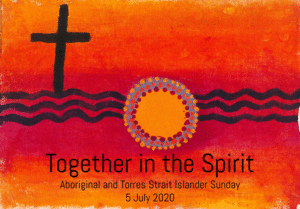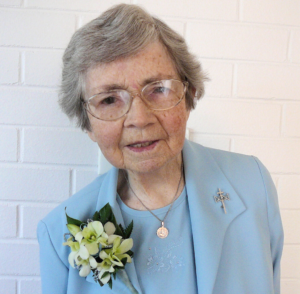Media Release: CRA
June 30, 2020100% of Religious Institutes named in Royal Commission Join National Redress Scheme

“The commitment of Catholic Religious Australia members to work compassionately with survivors of child sexual abuse has been ongoing for 20 years and continues to be demonstrated by religious institutes joining the National Redress Scheme (NRS),” said Br Peter Carroll FMS, President of Catholic Religious Australia (CRA)…
You’re invited to continue reading the Media Release and visit the CRA website below:
Aboriginal and Torres Strait Islander Sunday
On 5 July 2020 we celebrate Aboriginal and Torres Strait Islander Sunday.
 The first Sunday of July has been mandated by the Australian Catholic Bishops Conference as National Aboriginal and Torres Strait Islander (ATSI) Sunday. [1]
The first Sunday of July has been mandated by the Australian Catholic Bishops Conference as National Aboriginal and Torres Strait Islander (ATSI) Sunday. [1]
Celebrations are usually organised by the National Aboriginal and Torres Strait Islander Catholic Council (NATSICC) which is the peak advisory body to the Australian Catholic Bishops on issues relating to Aboriginal and Torres Strait Islander Catholics. [2]
The COVID-19 pandemic has forced NATSICC to rethink the ways in how we empower Catholics to celebrate our special day. This year, NATSICC have modified our Aboriginal and Torres Strait Islander Sunday resources to work in a digital setting. NATSICC are also holding the first-ever live-streamed, Aboriginal and Torres Strait Islander Sunday Mass from the St Francis Xavier Cathedral in Adelaide from 10am EST. The livestream will be available from the NATSICC homepage. [3]
NATSICC have invited everyone around Australia and the World to join them on Sunday 5 July 2020, as we come ‘Together in the Spirit’ to celebrate the gifts of spirituality and culture.
Please find below website links and resources for ATSI Sunday:
ATSI Sunday Mass Livestream (5 July 2020 – 10am EST)
Image: ATSI Sunday – ‘Together in the Spirit’ logo obtained from www.natsicc.org.au/2020-atsi-sunday.html
Footnotes:
[1] Aboriginal and Torres Strait Islander Sunday obtained from www.transformationbydesign.com.au/projects/aboriginal-and-torres-strait-islander-sunday
[2] About NATSICC obtained from www.natsicc.org.au/about-natsicc.html
[3] 2020 Aboriginal and Torres Strait Islander Sunday Resources obtained from www.natsicc.org.au/2020-atsi-sunday.html
A Day in the Life Series: Seafarers
June 26, 2020
Port Chaplaincy – Sydney Ports.
The Sydney waterfront portrays a rich tapestry of maritime life and industry. It is always a colourful, sometimes funny and often harsh but never a boring environment to minister within as Port Chaplain.
My role mainly involves that of presence within the port, and I regularly play the roles of advocacy and mediation.
Welcoming seafarers is a major part of my days. This involves the visitation of cargo ships and their multi-cultural, multi-faith seafarers onboard.
Samuel Johnson the famous English writer once likened being onboard ships to “…being in prison with the added “bonus” of the threat of drowning…”
Seafarers are usually driven into the maritime industry because of global poverty. Those landing a contract usually do so because they are the cheapest labour in the market.
They spend most of their lives isolated from family and loved ones. Their work is insecure as they rely on one contract at a time. The maritime industry can be cruel in terms of registering ships in tax havens such as Bermuda, Liberia etc. (AKA Flags of Convenience) where there is no regard for the seafarers’ human rights.
Along with all this exploitation seafarers live and work in constant danger due to bad weather, unseaworthy vessels and the threat of piracy and many other forms of abuse, with the fear of blacklisting if they complain.
Despite the best efforts globally to enact the Maritime Labour Convention 2006 and other laws intended to protect seafarers’ rights they remain out of sight and in international waters criss-crossing our seas.
The reality of course is that 98% of all commodities are brought to our shores by these people /seafarers. Most of what we wear, our white goods, computers, cars, farm machinery, food, medical supplies, fuel etc. Due to the demand for commodities the ships are obliged to move as quickly as possible which means that crews are denied the possibility of shore leave in any port.
This and many other conditions further exacerbate the isolation, loneliness which has detrimental effects on their wellbeing. The latest survey done by Yale university reveals that 20% of seafarers contemplate self-harm. We can well believe this now that we know that 4 seafarers have suicided in the last few weeks alone.

The chaplains’ role of course is to welcome the stranger as encouraged by the Gospel. For me this means welcoming seafarers, advocating, lobbying maritime authorities on their behalf and promoting their human dignity and rights. Working closely with the local and global maritime unions to respond to seafarers’ needs while in Australian waters and international waters is essential.
As port chaplain I also play a pastoral role with the other maritime stakeholders, wharfies, terminal managers, security, pilots etc. I endeavour to promote the concept of providing a ‘safe harbour’ for arriving crews by developing friendships with all other sectors involved in the port operations. This develops a sense of solidarity and collaboration and kindness within the waterfront.
In my opinion seafarers are resilient and courageous human beings who sacrifice much for their loved ones. They are regularly the first responders at sea to rescue those fleeing from war torn countries. They work at great personal cost to educate their children in the hope of escaping poverty.
Let us salute all seafarers.
Mary Leahy rsj
In Loving Memory of Sr Anita Gallagher
June 25, 2020Sr Anita Gallagher entered eternal life on 20 June 2020.
 We celebrate and give thanks for the life of Sr Anita.
We celebrate and give thanks for the life of Sr Anita.
Please see below booklets and the live stream link for the Memorial Service of Sr Anita at St Joseph’s Chapel, South Perth at 4:00pm on Sunday 28 June 2020 for a Vigil, and 10:15am on Monday 29 June 2020 for a Funeral Mass (Eucharistic Celebration):
Eucharistic Celebration booklet (PDF)
World Refugee Day
June 20, 2020As I had reflected on the Morning Prayer in the Josephite Prayer Book for Easter Sunday more than once during Easter Week, I had been struck by the artist Jesus Mafa’s portrayal of Jesus and Mary Magdalene.
The touching sense of relief, astonishment, welcome and delight on Mary Magdalene’s face seems to leave Jesus awed, speechless, reserved, keeping his distance. The image of a coloured Jesus reminds me of the hundreds of refugees who are longing for a welcome, someone to believe that they are worth something, that they are not frauds, that they have come through horrific ordeals.
Writing of the experience of Behrouz Boochani in Christchurch, New Zealand, Ben Doherty says:
“Here,” he says, “I feel free.”
 What a contrast to the bleak existence endured by Behrouz Boochani in the Manus Island Detention Centre for six years. An ethnic Kurd, from Ilam in the west of Iran, bordering Iraq, he described himself as a child of war. A graduate of two universities, with a Masters Degree in Political Science, Political Geography and Geopolitics, he was forced to flee his homeland after his journalism for the Kurdish magazine Werya, attracted the attention of Iran’s ruling regime. His life was in danger. He fled to Indonesia and then by boat to Australia. He thought Australia was a free country. ‘Reporters without Borders’, as well as a coalition of human rights groups, have warned that sending Boochani back to Iran would put his life in grave danger, as dissent is not tolerated by Iran’s theocratic regime. He has asked repeatedly to be handed to the United Nations.
What a contrast to the bleak existence endured by Behrouz Boochani in the Manus Island Detention Centre for six years. An ethnic Kurd, from Ilam in the west of Iran, bordering Iraq, he described himself as a child of war. A graduate of two universities, with a Masters Degree in Political Science, Political Geography and Geopolitics, he was forced to flee his homeland after his journalism for the Kurdish magazine Werya, attracted the attention of Iran’s ruling regime. His life was in danger. He fled to Indonesia and then by boat to Australia. He thought Australia was a free country. ‘Reporters without Borders’, as well as a coalition of human rights groups, have warned that sending Boochani back to Iran would put his life in grave danger, as dissent is not tolerated by Iran’s theocratic regime. He has asked repeatedly to be handed to the United Nations.
During his detention in Manus, Boochani wrote numerous articles for leading international media, notably The Guardian, The Sydney Morning Herald, The Refugee Action Committee. These articles were about the plight of refugees held on Manus Island, and he has won several awards. His memoir ‘No Friend but the Mountains’ published in November 2019, won the Victorian Prize for Literature and the Victorian Premier’s Prize for nonfiction. Getting the text written and out of Manus was itself an extraordinary feat. He tapped out the script on a mobile phone in a series of single messages over time and had them translated from Persian into English by a friend, Omid Tofighian.
 Behrouz Boochani is an example of survival, even triumph over dehumanising adversity. As well. he is one example of the very big contributions refugees have made and continue to make to their adopted countries. Behrouz is a gifted person who is using his gifts to advocate for asylum seekers who are still trapped in ways that deprive them of hope, condemning them to years of mental brokenness. He has become a spokesperson for the men in his compound, meeting with PNG immigration and other officials, as well as Amnesty International and UNHCR representatives. As The Guardian journalist Ben Doherty said, on accepting the Amnesty International Australia award, on Behrouz’s behalf in 2017: “Behrouz rightly sees himself as a working journalist on Manus Island, whose job it is to bear witness to the injustices and the violence and the privation of offshore detention.” (The Guardian 2/11/2017) [2]
Behrouz Boochani is an example of survival, even triumph over dehumanising adversity. As well. he is one example of the very big contributions refugees have made and continue to make to their adopted countries. Behrouz is a gifted person who is using his gifts to advocate for asylum seekers who are still trapped in ways that deprive them of hope, condemning them to years of mental brokenness. He has become a spokesperson for the men in his compound, meeting with PNG immigration and other officials, as well as Amnesty International and UNHCR representatives. As The Guardian journalist Ben Doherty said, on accepting the Amnesty International Australia award, on Behrouz’s behalf in 2017: “Behrouz rightly sees himself as a working journalist on Manus Island, whose job it is to bear witness to the injustices and the violence and the privation of offshore detention.” (The Guardian 2/11/2017) [2]
“It is like a duty, a responsibility, as a citizen in my future, to care about human rights,” Boochani said. “I will continue to work on this issue, because it is my life, I cannot walk away from my own life, my own experience. And Manus was my experience.” (The Guardian 16/11/2019) [1]
Boochani’s journey is but one example of the thousands who have made tortuous journeys to escape danger, deprivation and cruelty to find safety and a place to call home. Despite the appalling treatment, condemnations, racist rejections that have been endured along this journey, many have in the end found a community, helpful neighbours, magnanimous supporters, amazing generosity, schools that have welcomed the children. The wonderful organisations whose main work is service to refugees and asylum seekers, such as Asylum Seeker Resource Centre (ASRC), Jesuit Refugee Service (JRS), Centre for Asylum Seekers, Refugees and Detainees (CARAD), and other less known organisations and groups, do a noble task.
Margaret Keane rsj
Footnotes:
[1] Behrouz Boochani, brutalised but not beaten by Manus, says simply: ‘I did my best’ by Ben Doherty.
[2] Behrouz Boochani wins Amnesty International award for writing from Manus by Ben Doherty.
Image sources:
– Book cover: No Friend but the Mountain by Behrouz Boochani obtained from Amazon.com
– Child’s Hand Refugee by Anja obtained from Pixabay. Used with permission.
Feast of the Sacred Heart Message
June 19, 2020Greetings on the feast of the Sacred Heart.
Today (19 June) we celebrate the feast of the Sacred Heart. This feast speaks of the love God has for each of one of us and the love we are called to extend to one another. Devotion to the Sacred Heart was integral to the spirituality of both Fr Julian Tenison Woods and Saint Mary MacKillop. Mary MacKillop wrote to the Sisters in 1907 a reflection on the Sacred Heart. In it she reflects upon the special relationship that she has with the Sacred Heart. She writes:
How apt are these words as we come to celebrate the feast of the Sacred Heart in 2020? Danger has threatened our world through the existence of a small virus named COVID-19; people continue to be persecuted for the colour of their skin, their religious beliefs and their voice for justice; and our planet Earth is ravaged by unprecedented natural disasters and the destruction of the environment.
Our Sisters of Saint Joseph Constitutions remind us:
Saint Teresa of Avila reminds us our eyes are the eyes through which Christ looks compassion on our world today that same compassion which Saint Paul in his letter refers:
Compassion that capacity to stand in the shoes of another and see the world from that viewpoint. Recently we have seen this reflected in the program on SBS called ‘Filthy Rich and Homeless’ when five people have been sent to experience the realities of homelessness in our society. We have seen it in the many essential service workers especially the nurses and doctors who have risked their own lives to care for the life of another and at times making the ultimate sacrifice of their own life. We have seen it in a new sense of neighbourliness that has arisen out of the COVID-19 experience. We have seen it in the response of thousands of people across the world raising their voice against racial discrimination. We have seen it in the UNICEF and other volunteer groups working with those in refugee camps to put in place steps towards preventing the spread of the coronavirus. We have seen it in the simple gestures of kindness and words of encouragement and hope that have filled our world with love in these recent months.
Inspired by the compassionate way of Jesus we are called on this feast day to send forth from that sacred place within us, compassion and mercy on our world. Drawn into the very heart of God the source and fountain of all love we hear the Spirit whisper, ‘Go and embody my Love. Go to those places of deepest pain. Be my hands and feet. Be my eyes and ears. Be my tears and joy. Be my voice. Go plant seeds of love’.
Happy feast day.
Sr Monica Cavanagh
Congregational Leader
Sr Monica has provided a message from Pentecost in the video below:
Additionally, you’re invited to view a message for the feast of the Sacred Heart from the Congregational Leadership Team below:
CLT Feast of the Sacred Heart Message (PDF)
Footnotes:
[1] Letter Mary MacKillop to the Sisters 21 May 1907
[2] Letter Mary MacKillop to the Sisters 1873
Love Comes Looking for Us
Feast of the Sacred Heart.
 The heart of Jesus is viewed as a symbol of “God’s boundless and passionate love for humankind” [1] and in light of the writings of Teilhard de Chardin, Thomas Merton, Elia Delio, Beatrice Bruteau and others, is referred to as the Sacred Heart enflamed, the incarnate Word, the Cosmic Christ, the Centre of centres – intimately personal and yet boundlessly cosmic.
The heart of Jesus is viewed as a symbol of “God’s boundless and passionate love for humankind” [1] and in light of the writings of Teilhard de Chardin, Thomas Merton, Elia Delio, Beatrice Bruteau and others, is referred to as the Sacred Heart enflamed, the incarnate Word, the Cosmic Christ, the Centre of centres – intimately personal and yet boundlessly cosmic.
 In living the gospel of today through the lens of the Sacred Heart, Richard Rohr reminds us that we are living in a liminal space between two worlds – before and after COVID -19. [2] Consciously aware of the suffering and impact of the current pandemic we take the opportunity to raise our consciousness of love and new tenderness in communion with the Sacred Heart and with each other with a passion for God, for humanity and all the Cosmos.
In living the gospel of today through the lens of the Sacred Heart, Richard Rohr reminds us that we are living in a liminal space between two worlds – before and after COVID -19. [2] Consciously aware of the suffering and impact of the current pandemic we take the opportunity to raise our consciousness of love and new tenderness in communion with the Sacred Heart and with each other with a passion for God, for humanity and all the Cosmos.
The following musings may resonate with us as we contemplate the love of the Sacred Heart in the context of the Heart of Jesus, Heart of the Cosmos and our own heart.
Teilhard de Chardin’s spirituality revolved around his childhood and adult devotedness to the Sacred Heart. His vision of the Sacred Heart as the centre of the universe assists us in enlarging our heart’s consciousness of the reality of who we are and the reality of God-in-matter – a lovingly beating world-heart at one with our heartbeat and the heartbeat of our God. [3]
Elia Delio speaks of our Life in God as a daring adventure of love—a continuous journey of putting aside our securities to enter more profoundly into the uncharted depths of God. [4]
The words of Scripture and St. Mary MacKillop testify to God’s loving presence in our lives:
 Thomas Merton captures the vitality and intensity of God’s love as conveying the extravagance, the sheer exuberance, of love. [5]
Thomas Merton captures the vitality and intensity of God’s love as conveying the extravagance, the sheer exuberance, of love. [5]
In the writings of David Richo, we are invited to contemplate God seeking us:
 Historically the connection between the heart of Jesus and that of the heart of individuals is attributed to French Benedictine, Swami Abhishiktanananda.
Historically the connection between the heart of Jesus and that of the heart of individuals is attributed to French Benedictine, Swami Abhishiktanananda.
As one passes from depth to depth in one’s own heart, the awakened disciple reaches the ultimate depth of the heart of Jesus. [7]
Pope Francis challenges us to touch the wounds of Jesus as Thomas asked: to enter Jesus wounds. [8] We do this with open and responding hearts in communion with the Sacred Heart for all the suffering in today’s world particularly relating to COVID-19 that as people of hope a new world of greater compassion, equality and justice post COVID-19 might be a new reality for all.
Mary Oliver’s words could reflect the love of the Sacred Heart in the mystery of God’s exuberant and inclusive love in our troubled world when she invites us to:

Margaret Cleary rsj
Footnotes:
[1] Wikipedia definition
[2] Center for Action and Contemplation,Richard Rohr- 28 April 2020
[3] Everything Ablaze, David Richo, P. 59
[4] Omega, Elia Delio – dated 27 April, 2020
[5] ‘The Art of Thomas Merton, John Moses, P.46
[6] Everything Ablaze, David Richo, P.57
[7] Radical Optimism, Beatrice Bruteau, P.96
[8] Daily Reflections, Pope Francis, P.129
[9] Daily Love – National Geographic (March 22)
Laudato Si’ Webinar: Part Three
June 18, 2020In May 2015 Pope Francis launched his encyclical with the subtitle “On Care for our Common Home” and the title “Laudato Si’” which are the opening words for a hymn composed by St Francis of Assisi in the 1200s.
For our time, this document is both relevant and important, since it highlights the priority that respect for the environment should have in Catholic life, and integrates the notion with what is central to our understanding of humanity’s relationship with God.
